From the Chicago Reader (April 6, 2001). This is also reprinted in my collection Essential Cinema.— J.R.
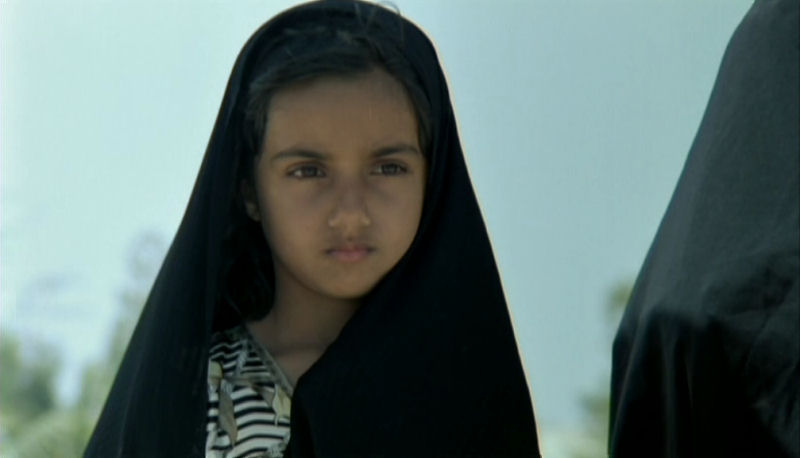
The Day I Became a Woman
***
Directed by Marzieh Meshkini
Written by Mohsen Makhmalbaf
With Fatemeh Cheragh Akhtar, Hassan Nabehan, Shabnam Toloui, Cyrus Kahouri Nejad, Azizeh Seddighi, and Badr Irouni Nejad.
“Aren’t you afraid?” some of my stateside friends asked before I visited Iran for the first time last February. “Only of American bombs,” I replied. Notwithstanding all of the things that are currently illegal there — such as men and women shaking hands or riding in the same sections of buses — I’m not sure I’ve ever been anyplace where people display more social sophistication in terms of hospitality, everyday courtesy, or sheer enterprise in the use of charm and persistence to get what they want. Some of this character came through in Divorce Iranian Style, a fascinating documentary that turned up at the Film Center a couple of years ago showing the aggressive resourcefulness of Iranian women in divorce court, despite the repressive laws they have to work with.
The locals I spoke to tended to be pessimistic about the reformist movement — regarding Mohammad Khatami about as skeptically as American liberals regarded Bill Clinton during his last year in office — but it also quickly became clear that some aspects of Iranian life are not defined by Islamic fundamentalism and that what might seem hopeless in one context might be possible in another. Read more
A column for Caiman Cuadernos de Cine, submitted May 28, 2018. — J.R.
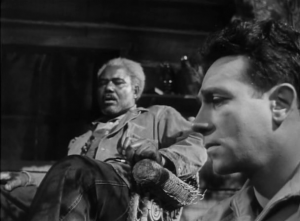
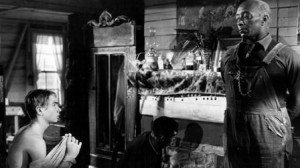
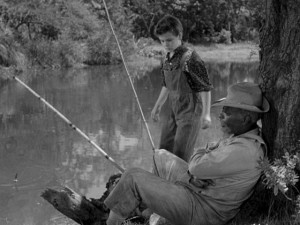
The commodification of film categories that publicists otherwise find difficult to market — especially “independent,” “restoration,” and “film noir”—often involves a certain amount of deception when it comes to existential identities.
“Independent” became a commercial category only after moguls maintained that the Sundance Festival was devoted to celebrating films without studio backing — even though “success” at Sundance meant a studio sale that typically entailed a loss of independence. “Restoration” is a label that absurdly gets slapped onto all sorts of real or alleged upgrades of older films, such as one with a newly mutilated and reconfigured soundtrack (the 1992 rerelease of Orson Welles’ Othello), a re-edit (the 1998 Touch of Evil), a belated first edit (the posthumous 2018 The Other Side of the Wind), and sometimes merely a new print. And “film noir” — a term whose meaning has already been slippery to begin with, applied retrospectively to a group of films said to share certain stylistic, formal, and thematic traits — now functions ahistorically and sometimes deceptively while increasing the market value of a given feature by obfuscating its politics.
On Criterion’s new Blu-ray of Frank Borzage’s Moonrise (1948), Peter Cowie’s interview with Hervé Dumont — whose book on the director should be shelved alongside Chris Fujiwara’s book for the same publisher (McFarland) on Jacques Tourneur — primed me perfectly for my second look at this masterpiece. Read more
From Film: The Front Line 1983 (Denver, CO: Arden Press, 1983).
Although I still agree with most of my arguments here, it’s now clear to me that my characterization of Paul Schrader’s politics in 1983 were oversimplified at best, and simply wrong at worst. — J.R.
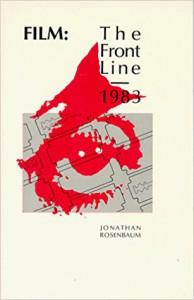
Tenants of the house,
Thoughts of a dry brain in a dry season.
T.S. Eliot, Gerontion
Preface: When I was approached last year about inaugurating a series of volumes surveying recent avant-garde film, I immediately started to wonder about how this could be done. Having lived nearly eight years in Paris and London and about as long in New York, I’ve had several opportunities to note the relative degree of information flow between these and other centers of avant-garde film activity, and the growing isolation of New York from these other centers made my own fixed vantage point less than ideal in some ways. When a colleague told me that Jonas Mekas had recently said that it was no longer possible to know what was happening in experimental film as a whole, a bell of recognition rang in my head, and I knew at once that Mekas was the only available oracle l could turn to. Read more





